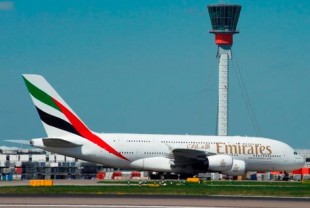

Emirates mulls jets for up to 800 passengers

Dubai’s Emirates Airline, the world’s largest operator of Airbus A380 double-decker superjumbos, would be interested in buying even bigger aircraft capable of carrying up to 800 passengers, a senior executive revealed, but conceded manufacturers were a decade away from developing such technology.
“I think there is no doubt about it, there will be more demand for higher-capacity aircraft, purely driven by the capacity and congestion you have at airports and airspace,” Adel Al Redha, executive vice president of engineering and operations at Emirates, told Arabian Business.
Emirates has in its fleet 26 517-passenger A380s in service and a further 64 on order and Al Redha said the carrier would be interested in larger aircraft if they were available.
“It is always difficult to get slots in any international airport today… The only way to fill your need is to operate that kind of aircraft.
“I think the size we would look at right now is the treble aircraft configuration that goes from 500 to 800 passengers,” he added.
He said seating capacity was not the only factor considered when ordering new aircraft: “Seating capacity is not the only thing we look at; we look at the range associated with that, so 300-plus passengers and an aircraft that can take up to 7,000 to 8,000 nautical miles and has a power supply for 13 hours.”
Al Redha said it was unlikely that a triple-decker style aircraft would be developed and brought to market within the next decade.
Earlier this month, the Dubai-based carrier's president Tim Clark told Arabian Business that Emirates was likely to order 100 planes or more from Boeing if the US plane manufacturer upgraded the design of the wide-body 777 with a newer model.
"If Boeing produced the airplane that we want I can see easily that figure, bearing in mind that we've ordered 175 of them," Clark said.
"If it's as good as we hope it'll be, it's a natural thing to say 'yes we would probably roll over what we have to what they're offering with the new aircraft'."
If Chicago-based Boeing was to produce the next generation of the long-haul 777-300ER (Extended Range), its most profitable aircraft to date, an order of 100 jets from Emirates would probably cost more than US$36bn considering the current list price for the 777-300ER.
Despite Al Redha’s aspirations, Clark also told UK-based Aviation Week “there is a question mark over the large end” of the market and demand for larger aircraft like the A380.
“Are airlines stepping up to buy [the A380] at the pace Airbus would like? Probably not. Are they stepping up to buy the competitor aircraft 747-8I? No,” he was quoted as saying.
“Look at the state of the aviation industry. Look at the state of the liquidity and debt providers. I would like to think this is a temporary thing.” Once long-haul travel is restored after the current downturn, “the A380 is a very elegant, environmentally friendly and economically efficient way of meeting that demand,” he added.
The fast growing Dubai airline, the largest in the world in terms of international passenger traffic, this month posted a 104 percent growth in profits in the first six months of its financial year, despite high oil prices and a depressed global aviation industry.
Profits rose to US$464m, while Emirates Group profits rose by 68 percent to US$575m. The airline was helped by marginally lower fuel costs as a percentage of total expenditure, which stood at 39 percent, down two percentage points year-on-year.
Group revenue rose by 17 percent to US$8.2bn over the previous period, helped by a seat factor that increased to 80 percent, from 79 percent last year.
The airline – the world’s biggest in terms of international km flown – has carried 18.7m passengers since 1 April this year, a 15.1 percent increase.